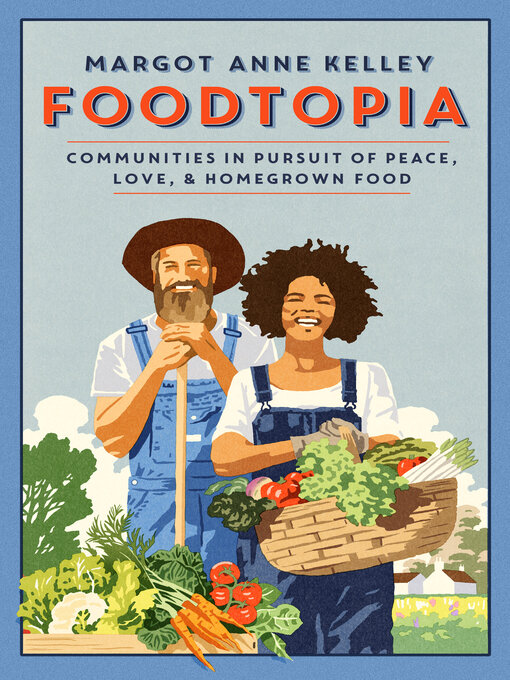"Insightful...empathetic...a thoughtful consideration of a topic that will have a substantial impact on our future."—Booklist
Readable Feast, Book Award Winner for Socially Conscious Writing * Civil Eats' Food and Farming Book Pick
Ever wonder if there's a better way to live, work, and eat? You're not alone. Here is the story of five back-to-the-land movements, from 1840 to present day, when large numbers of utopian-minded people in the United States took action to establish small-scale farming as an alternative to mainstream agriculture. Then and now, it's the story of people striving to live freely and fight injustice, to make the food on their table a little healthier, and to leave the planet less scarred than they found it.
Throughout America's history as an industrial nation, sizable countercultural movements have chosen to forgo modern comforts in pursuit of a simpler life. In this illuminating alternative American history, Margot Anne Kelley details the evolution of food-centric utopian movements that were fueled by deep yearnings for unpolluted water and air, racial and gender equality, for peace, for a less consumerist lifestyle, for a sense of authenticity, for simplicity, for a healthy diet, and for a sustaining connection to the natural world.
Millennials who jettisoned cities for rural life form the core of America's current back-to-the-land movement. These young farmers helped meet surges in supplies for food when COVID-19 ravaged lives and economies, and laid bare limitations in America's industrial food supply chain. Their forebears were the utopians of the 1840s, including Thoreau and his fellow Transcendental friends who created Brook Farm and Fruitlands; the single taxers and "little landers" who created self-sufficient communities at the turn of the last century; Scott and Helen Nearing and others who decamped to the countryside during the Great Depression; and, of course, the hippie back-to-the-landers of the 1970s.
Today, food has become an important element of the social justice movement. Food is no longer just about what we eat, but about how our food is raised and who profits along the way. Kelley looks closely at the efforts of young farmers now growing heirloom pigs, culturally appropriate foods, and newly bred vegetables, along with others working in coalitions, advocacy groups, and educational programs to extend the reach of this era's Good Food Movement.
Foodtopia is for anyone interested in how we all might lead much better—and well-fed—lives.
-
Creators
-
Publisher
-
Release date
August 9, 2022 -
Formats
-
Kindle Book
-
OverDrive Read
- ISBN: 9781567927313
-
EPUB ebook
- ISBN: 9781567927313
- File size: 3195 KB
-
-
Languages
- English
-
Reviews
-
Library Journal
May 1, 2022
In this book combining journalism and history, Kelley (A Field Guide to Other People's Trees) traces the philosophical and cultural movements that led to notable utopian experiments in the United States. A new generation of younger people pursuing utopian food system dreams has emerged out of food writing from the early 2000s such as Barbara Kingsolver's Animal Vegetable Miracle, and while Kelley starts here, her larger project is an examination of the desires around food of previous utopian movements in American history. She also looks at what s particularly resonant about a given landscape or natural environment. As a Maine-based writer, Kelley naturally focuses on New England, but also looks at California's hippie food movements, among others. This book makes the case that food is central to the success of utopian movements--those that assume food will take care of itself are doomed to fail. Kelley writes that wider change has also come from food systems that include mentoring and agricultural training and are deeply embedded in local cultural values and needs (e.g., the Black Panther Party's free breakfast program). VERDICT Essential reading on the state of local and organic growing and eating, and a useful addition to the history of American utopianism.--Margaret Heller
Copyright 2022 Library Journal, LLC Used with permission.
-
Publisher's Weekly
May 30, 2022
Environmental writer Kelley (Local Treasures) puts a human face on the back-to-the-land movement with fascinating profiles of the “renegades” behind the centuries-old phenomenon. Tracing food’s function as political expression throughout history, Kelley paints in vivid detail the lives of such food pioneers as homesteader Scott Nearing, coauthor of the 1954 classic Living the Good Life, and Chez Panisse founder Alice Waters; dips into Walden Pond, Thoreau’s “utopian back-to-the-land experiment”; explores the food activism of the Diggers of 1960s San Francisco, who believed that “food should not be corporatized”; and moves to the present, examining the ways the Covid pandemic gave rise to a new crop of millennial farmers. Kelley, herself “part of a shift in the zeitgeist” when she and her husband left Boston for Maine in the 2000s, employs an earnest, occasionally poetic tone (“The air was suffused with the scents of rhubarb and Earl Grey tea”) but isn’t starry-eyed, taking pains to underscore the persistent “racial inequity in the US food system.” Whether assessing the influence of the macrobiotic diet or considering a project to repurpose a former county jail into a grain mill, she excels at drawing the big picture around human relationships to food, resulting in a satisfyingly substantive work. Farmers and foodies will savor every delectable insight.
-
Formats
- Kindle Book
- OverDrive Read
- EPUB ebook
subjects
Languages
- English
Loading
Why is availability limited?
×Availability can change throughout the month based on the library's budget. You can still place a hold on the title, and your hold will be automatically filled as soon as the title is available again.
The Kindle Book format for this title is not supported on:
×Read-along ebook
×The OverDrive Read format of this ebook has professional narration that plays while you read in your browser. Learn more here.


